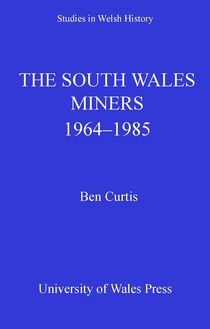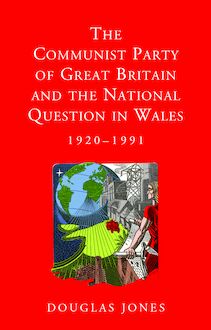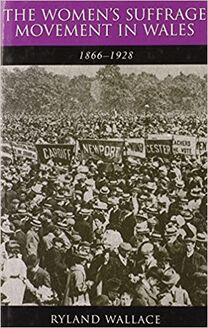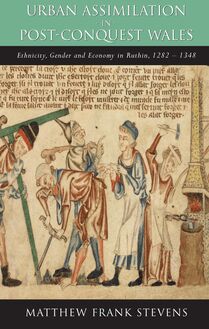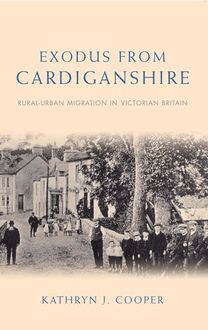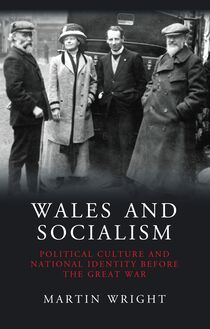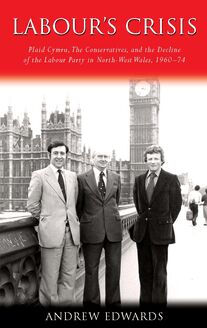The South Wales Miners , livre ebook
148
pages
English
Ebooks
2013
Vous pourrez modifier la taille du texte de cet ouvrage
Obtenez un accès à la bibliothèque pour le consulter en ligne En savoir plus
Découvre YouScribe en t'inscrivant gratuitement
Découvre YouScribe en t'inscrivant gratuitement
148
pages
English
Ebooks
2013
Vous pourrez modifier la taille du texte de cet ouvrage
Obtenez un accès à la bibliothèque pour le consulter en ligne En savoir plus
Publié par
Date de parution
15 mai 2013
Nombre de lectures
2
EAN13
9781783165551
Langue
English
Poids de l'ouvrage
4 Mo
The booming coal industry of the nineteenth and early twentieth centuries was the main reason behind the creation of modern south Wales and its miners were central to shaping the economics, politics and society of south Wales during the twentieth century. This book explores the history of these miners between 1964 and 1985, covering the concerted run-down of the coal industry under the Wilson government, the growth of miners resistance, and the eventual defeat of the epic strike of 1984-5. Their interactions with the wider trade union movement and society during these years meant the miners were amongst the most important strategically-located sections of the British workforce during this time. The South Wales Miners is the first full-length academic study of the miners and their union in the later twentieth century, in a tumultuous period of crisis and struggle.
Publié par
Date de parution
15 mai 2013
Nombre de lectures
2
EAN13
9781783165551
Langue
English
Poids de l'ouvrage
4 Mo
STUDIES IN WELSH HISTORY
Editors
RALPH A. GRIFFITHS CHRIS WILLIAMS ERYN M. WHITE
________
34
THE SOUTH WALES MINERS 1964–1985
THE SOUTH WALES MINERS 1964–1985
by BEN CURTIS
Published on behalf of the University of Wales
© Ben Curtis, 2013
All rights reserved. No part of this book may be reproduced in any material form (including photocopying or storing it in any medium by electronic means and whether or not transiently or incidentally to some other use of this publication) without the written permission of the copyright owner. Applications for the copyright owner’s written permission to reproduce any part of this publication should be addressed to the University of Wales Press, 10 Columbus Walk, Brigantine Place, Cardiff CF10 4UP.
www.uwp.co.uk
British Library CIP Data A catalogue record for this book is available from the British Library ISBN 978-0-7083-2610-7 (hardback) 978-0-7083-2611-4 (paperback) e-ISBN 978-1-78316-555-1
The right of Ben Curtis to be identified as author of this work has been asserted in accordance with sections 77 and 79 of the Copyright, Designs and Patents Act 1988.
Picture Credit: Miners at Clydach Vale, Tonypandy, 1965# Roger Bamber / Alamy
For Natalie and Elinor and In memory of my mother Krystyna (1946–2012), three generations of Curtis women
SERIES EDITORS’ FOREWORD
Since the foundation of the series in 1977, the study of Wales’s history has attracted growing attention among historians internationally and continues to enjoy a vigorous popularity. Not only are approaches, both traditional and new, to the study of history in general being successfully applied in a Welsh context, but Wales’s historical experience is increasingly appreciated by writers on British, European and world history. These advances have been especially marked in the university institutions in Wales itself.
In order to make more widely available the conclusions of original research, much of it of limited accessibility in postgraduate dissertations and theses, in 1977 the History and Law Committee of the Board of Celtic Studies inaugurated this series of monographs, Studies in Welsh History. It was anticipated that many of the volumes would originate in research conducted in the University of Wales or under the auspices of the Board of Celtic Studies, and so it proved. Although the Board of Celtic Studies no longer exists, the University of Wales continues to sponsor this series. It seeks to publish significant contributions made by researchers in Wales and elsewhere. Its primary aim is to serve historical scholarship and to encourage the study of Welsh history.
CONTENTS
SERIES EDITORS’ FOREWORD
ACKNOWLEDGEMENTS
ABBREVIATIONS
LIST OF ILLUSTRATIONS
LIST OF MAPS
NOTE ON CAPITALISATION
Introduction: ‘an historical mission to lead in class struggles’
I The Politics of the South Wales Miners
II Closures: 1964–1970
III Struggle: 1970–1974
IV Interlude: 1974–1979
V Confrontation: 1979–1983
VI The Strike: 1984–1985
Conclusion
NOTES
BIBLIOGRAPHY
ACKNOWLEDGEMENTS
Writing a book is both a solitary and a communal activity. Writing is solitary in that no-one else in the world understands exactly what you are really doing, no-one else must put in the long hours and years of research, writing, revision, frustration and small triumphs. It is communal in that it would be impossible to make it through the solitary struggle without the help of a great many people. I should like to acknowledge the many debts of gratitude that I have accumulated over the course of my work, the principal ones of which are listed here.
This book has been a long time in the making. It is mainly based on my PhD thesis, research for which began over a decade ago now. First, I would like to thank my doctoral supervisors, Professor Chris Williams and Dr Andy Croll, for their guidance and assistance, both during the years of my PhD research and subsequently. I am also extremely grateful for the generous advice and support which I received from the late Professor Nina Fishman, whose untimely passing is a great loss to the history of the labour movement. The transition from thesis to monograph has also been quite a lengthy process. In this respect, I should like to thank Professor Ralph Griffiths for his extensive and meticulous advice and assistance in revising the monograph manuscript, as well as to thank Sarah Lewis of the University of Wales Press for her prompt and helpful responses to my many and various queries.
Given that my research is a study of the history of the south Wales miners which relies primarily on the publications and internal records of the NUM as its source material, I am especially grateful for the assistance shown to me by the National Union of Mineworkers (SouthWales Area). Without the many months I spent working through the archive at the NUM Area Office in Pontypridd, it would not have been possible for me to have completed this book in the form that I intended. Consequently, I should particularly like to thank Wayne Thomas, Dorothy Lewis, Carole Jones and Ron Stoate for being unstintingly helpful towards me during my time there. Much of the rest of my research was conducted at the South Wales Miners’ Library and I should also very much like to thank Siân Williams and the staff there. In addition to this, I should like to note my appreciation of the assistance I received from Darren Treadwell and the other archivists at the People’s History Museum in Manchester during my visit there, as well as the staff of the National Library of Wales and the National Archives.
I should like to thank all the people whom I interviewed during the course of my work, whose names are listed in the bibliography. These interviews gave an invaluable ‘feel’ for the viewpoints of miners during the turbulent period covered by this study. For me, these meetings constituted one of the main highlights of my research programme.
With regards to the photographic illustrations which form part of this book, I should like to thank the following copyright holders for permission to reproduce them: the National Union of Mineworkers (South Wales Area), Martin Shakeshaft, Media Wales Ltd, the South Wales Coalfield Collection at Swansea University, and the National Museum Wales.
I am very grateful to all my friends for their companionship and encouragement throughout the course of writing this book. Particular thanks go to Chris Beck, whose IT skills were largely responsible for the creation of the maps that form part of this book. In addition to him, I should also like to thank Darren and Siân Williams (a different Siân from the one mentioned above!), Shahid Mian, Stephen Marsland, and Ben and Veronica Cottam. It would be remiss, too, not to acknowledge the contribution made by my cats, Hector and Aristotle, who did their inadvertent utmost to hinder the completion of this monograph.
Last but by no means least, I should like to thank my family: Jack Smith, my brother Sam and his wife Lisa, my sister Lucy Strand and her husband Matt, my aunt Mary Harman, my parents-in-law Irene and Paul Charlton, and my sister-in-law Alison Charlton. Finally, three people deserve particular mention: my wife Natalie, for her love and support; my daughter Elinor, who arrived in March 2012; and my mother Krystyna, for her unwavering belief in me throughout my academic career, who sadly passed away earlier this month, just as the final version of the monograph manuscript was being prepared for publication. This book is dedicated to them.
B EN C URTIS Newbridge, July 2012
ABBREVIATIONS ACAS Advisory, Conciliation and Arbitration Service ANL Anti-Nazi League APEX Association of Professional, Executive, Clerical and Computer Staff Area NUM South Wales Area (unless otherwise stated) ASLEF Associated Society of Locomotive Engineers and Firemen AUEW Amalgamated Union of Engineering Workers BLOC Broad Left Organising Committee BSC British Steel Corporation CAWU Clerical and Administrative Workers’ Union (later APEX) CBI Confederation of British Industry CEGB Central Electricity Generating Board CLC Central Labour College COHSE Confederation of Health Service Employees COSA Colliery Officials and Staffs Area CP(GB) Communist Party (of Great Britain) DHSS Department of Health and Social Security EC Executive Council (of the South Wales NUM unless otherwise stated) EETPU Electrical, Electronic, Telecommunications and Plumbing Union EPEA Electrical Power Engineers’ Association FBU Fire Brigade Union GMBATU General, Municipal, Boilermakers’ and Allied Trades Unions IMF International Monetary Fund ISTC Iron and Steel Trades Confederation JNNC Joint National Negotiating Committee MFGB Mineworkers’ Federation of Great Britain MINOS Mine Operating System MI5 British Security Service NACODS National Association of Colliery Overmen, Deputies and Shotfirers NCB National Coal Board NCC National Co-ordinating Committee NEC National Executive Committee (of the NUM unless otherwise stated) NF National Front NPLA National Power Loading Agreement NUGMW National Union of General and Municipal Workers (later GMBATU) NUM National Union of Mineworkers NUPE National Union of Public Employees NUR National Union of Railwaymen NUS National Union of Seamen OPEC Organisation of Petroleum Exporting Countries PLP Parliamentary Labour Party ROLF Remotely Operated Longwall Face SOGAT Society of Graphical and Allied Trades SWMF South Wales Miners’ Federation SWP Socialist Workers Party TGWU Transport and General Workers’ Union TUC Trades Union Congress UCATT Union of Construction, Allied Trades and Technicians UCS Upper Clyde Shipyard UDC Urban District Council UDM Union of Democratic Mineworkers Union National Union of Mineworkers (unless otherwise specified) VERS Voluntary Early Retirement Scheme WCSMC Wales Congress in Support of Mining Communities WTUC Wales Trade Union Council AAC NUM (South Wales Area) Annual Conference minutes ASC NUM (South Wales Area) Special Co


